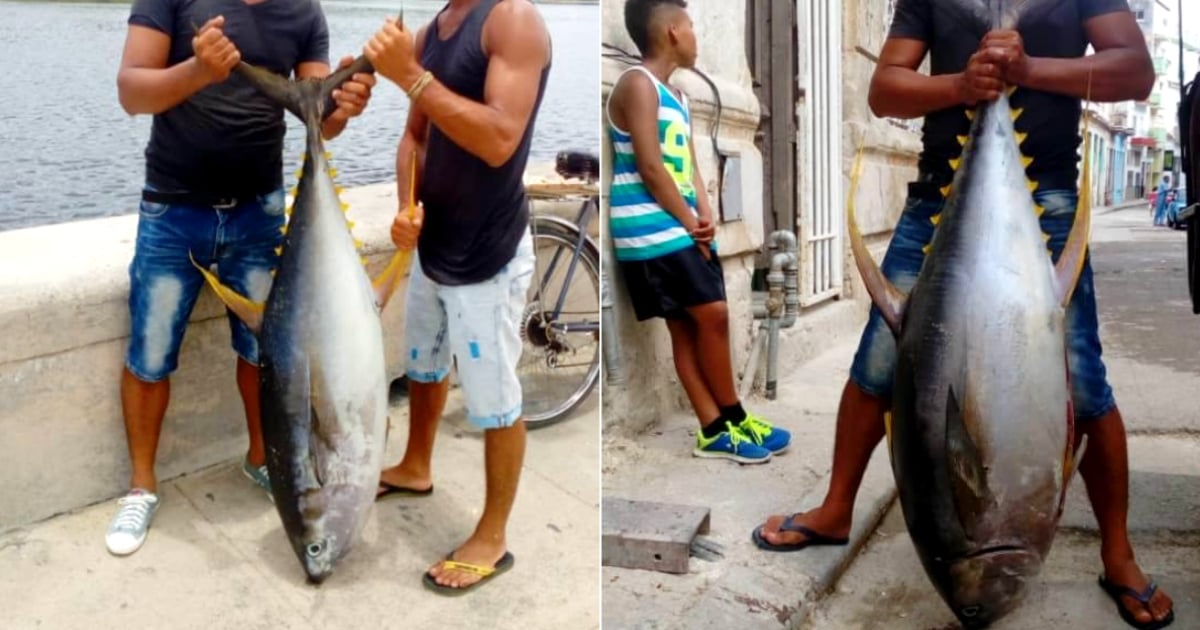
A couple of Cuban fishermen experienced a unique day of work by catching a huge tuna in the waters of Havana this Sunday.
This was announced by the Facebook profile Pesca en Miami, which shared images of both fishermen with their catch, posing on the Malecón of the Cuban capital.
"Record on the Malecón in Havana, Cuba. Huge tuna. Congratulations friends," said Pesca in Miami in a post that received more than a thousand comments from Cubans congratulating the fishermen and debating the situation of fishing under the communist regime.
While some warned that the Cuban police confiscate the catches from Cuban fishermen and others believed that fishing activity is completely banned or heavily restricted on the island, several users explained that both views were partially true, but that the reality was more complex.
In March 2022, two Cubans claimed to have caught on camera a giant yellowfin tuna weighing about 710 pounds, with a 120-pound test line and using a mackerel as bait.
"The fight lasted more than four hours," wrote Luis Alberto Roca Hernández in the Facebook group "Camera and Cork Fishers in Cuba," where the post went viral with over 2,400 reactions and nearly 500 comments.
"It was sold for much more than 150 thousand pesos. Thank you all," wrote Roca Hernández in the comments.
Did the supply of fish in Cuba increase after the approval of the Fishing Law?
In February 2020, the Cuban government published the Fishing Law, approved in July 2019, which regulates fishing activity in the country, the authorizations and requirements to carry out such practice, as well as its prohibitions and restrictions.
Among the most important aspects to highlight from the regulation, it is established that only legal or natural persons, Cuban or foreign, over 17 years of age, with licenses to do so, can carry out this activity. These licenses will be issued for a period of one calendar year (from January to December) and may be suspended at any time for violations of the law.
The text recognized the self-employed individuals who engage in this work, who are now subject to the social security system, an aspect that the authorities used to defend the need to enact the law. About 2,500 people were engaged in illegal fishing in the country at that time, according to official estimates.
The regulation also establishes that fishermen will need permits to fish from Punta Gobernadora to Punta Hicacos Varadero, as well as from Punta de Prácticos to Punta de Maisí, from there to Cabo Cruz, from Playa Girón to María Aguilar, and from Cabo de San Antonio to Cabo Francés.
These areas were established for sport fishing, recreational fishing, and commercial fishing for social self-consumption. Greater restrictions were established in the so-called "territories of preferred tourist use," such as Cayo Saetía, the North Coast of Holguín, the cays in the north of Isla de la Juventud, and Cayo Largo; as well as other areas of the Cuban archipelago.
The Fishing Law came into effect in August 2020 and sparked backlash among many Cuban fishermen who saw their catch zones restricted, making it difficult to support their families, in addition to the direct impact on the population.
Cuban fishermen can face fines ranging from 1,000 to more than 5,000 pesos for violating regulations. In the event of multiple violations, they pay the total of the fines established in Article 32 and classified in Article 34. If they repeat an illegal act within a year, the fine is doubled.
In December 2022, Cuban leader Miguel Díaz-Canel stated that there is no food, livestock, or fish in Cuba, despite having drafted laws to promote these activities on the island.
"The problem is that we have three laws: We have a Food Sovereignty Law, and there are no foods; we are going to approve a Livestock Promotion Law, and there is no livestock; and we have a Fishing Law, and there is no fish," admitted the leader during the ordinary session of the National Assembly of People's Power regarding the economic plan for 2023.
Addressing the parliamentarians, he warned: “We have already moved forward with the laws, now we need to ensure that those laws are not just expressed here in terms of fines and restrictions, and that we imposed so many fines for theft and sacrifice, or that we imposed so many fines for land violations or illegal fishing.”
According to the president, the purpose is to ensure that “we evaluate the Law of Food Sovereignty here, so that there are more foods on the tables of Cubans, and what we need to achieve with the Law of Livestock Promotion is to truly promote the livestock that we need in the country to avoid dependency on imports and to have meat on the tables of the Cubans.”
In that same vein, he argued: "What we need is for the Fishing Law to stimulate fishing, to be less restrictive, to provide all the possibilities for an island that is surrounded by sea, where there are times of the year when many fish are running, let's take advantage of those potentials with the whole concept of sustainable development and have fish on the tables of Cubans as well."
What do you think?
COMMENTFiled under: